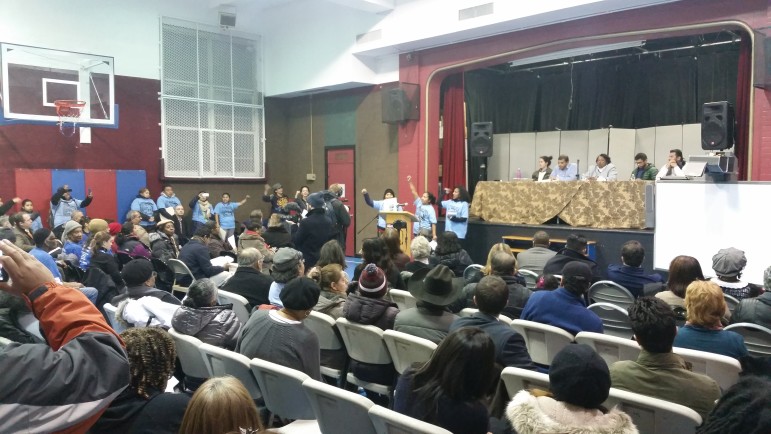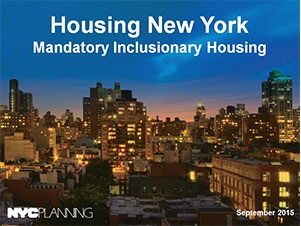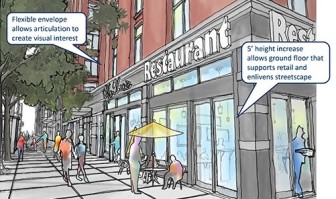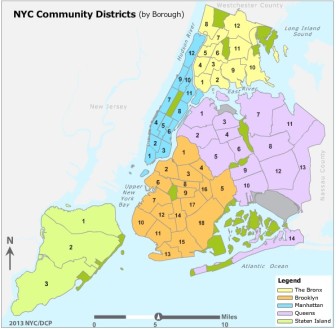
Andrew Padilla
Members of Movement for Justice in El Barrio speak against the mayor's proposals at the CB11 meeting.
On Monday night, East Harlem’s CB11 voted “no” with conditions to Mayor de Blasio’s two citywide zoning changes. Tenants and advocates came out in force for the third time this month to oppose the plan and the gentrification they fear it would cause.
Like the city’s 58 other community boards, Manhattan Board 11 had a chance under the city’s Uniform Land-Use Review Procedure to weigh in on the Mandatory Inclusionary Housing (MIH) proposal, which would require income-targeted units in any new development that takes advantage of an upzoning, and Zoning for Quality and Affordability (ZQA), which amends a number of rules regarding building heights, setbacks and design features that the administration says must be updated to permit more housing creation.
Overall, the 500+ pages of proposed changes are the biggest zoning-law shift the city has considered in decades.
“We ask you to vote unconditionally against MIH & ZQA” said Sandra Cruz , a member of the tenant organization Movement for Justice in El Barrio. “We are against the Mayor’s luxury housing plan because 70 to 75 percent of the housing will be luxury housing for rich people. We don’t even earn enough to pay the ‘affordable’ rents in the 25 to 30 percent set aside for us.”
Ray Tirado, a Union Local 79 member who belongs to Community Voices Heard, worried about the impact that more market-rate units would have on the real-estate pressures that residents are already facing. “My landlord is building a six-story building on top of my house and trying to kick out the few of us that remain. We can’t incentivize more of that in East Harlem,” he said.
Many wondered if the affordable units mandated through MIH could even be guaranteed for East Harlem.

The Mandatory Inclusionary Housing proposal would require a share of new housing units be income-targeted whenever a major rezoning takes place. Click here to read more about it.
“One of the trade-offs that community boards usually ask for during rezonings is 50 percent community preference, but that preference is currently being challenged under the Fair Housing Act,” said Marie Winfield of Community Board 11. If the community preference rule is ruled illegal, Winfield said, the city wouldn’t be able to guarantee that local residents would benefit from zoning changes, even if it wanted to.
HPD declined to comment on pending litigation regarding community preference, but did attempt to calm the community’s concerns regarding affordability:
“Affordable units would be at an average of 60 percent area median income (AMI)–an average, meaning we’re reaching down lower,” said Matt Murphy, HPD Assistant Commissioner of Strategic Planning. “With our other tools we can always layer in more affordability.”
But CB11 rejected that argument and MIH, citing the very metrics used to define affordability. “We get that HPD has tools to get more affordability, but we don’t want that,” said Alvin Johnson of CB11. “Our poorest zip code, 10035, has an AMI of $24,000 a year. We want you to start your calculations for ‘affordability’ at the AMI of this community board, at what we actually make! That’s going to be the cost of doing business here in East Harlem.”
CB11 also rejected ZQA. “Under ZQA affordability for seniors is not permanent,” said CB11 chair Diane Collier, who was also concerned that ZQA reduced the minimum size of senior apartments.
The board said tenant speak-outs on November 9th and 17th weighed heavily in its decision-making. But it was clear Monday that the board and the tenants in the audience were not in lock-step.
Despite CB11’s “no” vote, Collier appeared interested in continuing a dialogue with the city: “We want to keep talking with HPD and DCP. We think this can be fine tuned so we can have truly affordable housing, a truly inclusionary plan, increasing our economy within East Harlem.”
(Read the full text of CB11’s draft resolutions on MIH and ZQA)

Zoning for Quality and Affordability is a proposal to update the city's zoning rules on building height, setbacks and other features in order to foster more housing development. Click to read more.
As CB11’s conditions—including a push for deeper affordability—were read aloud, members of Movement for Justice interrupted, demanding a firm no. “This is just a way for them to look like they are supporting the community until they get their conditions, and then they will be in favor of the mayor’s revised ‘luxury housing plan for the rich’,” said Maria Aguirre.
“We know this community board has a history of supporting upzonings, even under mayor Bloomberg. For that reason, we do not trust you,” said Cruz. “East Harlem is already being gentrified because of your history of supporting upzonings. We don’t want the mayor’s rezoning under any conditions!” Tenants left chanting: “El Barrio No Se Vende, Se Ama Y Defiende! (El Barrio is not for sale. It is to be loved and defended!)” The group plans to continue protesting the mayor’s rezonings and has already released its own 10-point plan to preserve rent-stabilized housing.
“We have all sorts of questions and concerns we’re fielding from people across the city,” said Howard Slatkin, DCP Deputy Executive Director of Strategic Planning. “This is all about getting information to inform the public review process.”
CB11’s votes, like the many other “no” votes by other boards who have weighed in on the proposals, are non-binding. The vote that does count is that of the Council. In East Harlem’s case, the district is that of the speaker of the City Council, Melissa Mark-Viverito. All of the community boards that comprise the speaker’s district have rejected the mayor’s plan.
On Tuesday, Mayor de Blasio seemed to downplay the concerns of community boards across NYC saying: “They don’t have a perfect vantage point on their communities.”










2 thoughts on “East Harlem Board Votes ‘No’ on De Blasio’s Zoning Changes”
ElBarrioUnite.org
elbarriounite.org